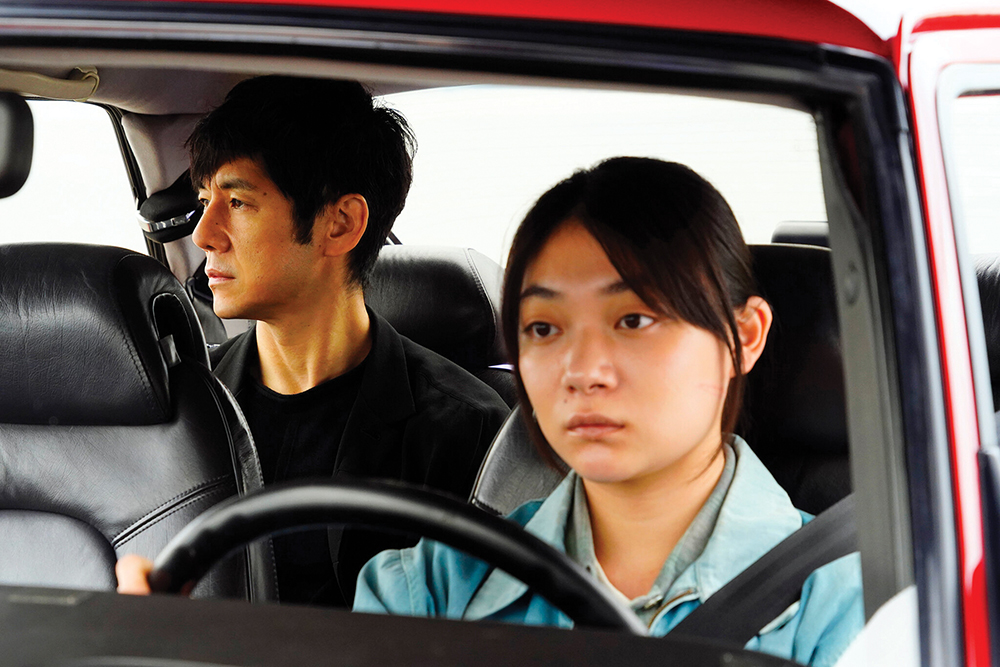A friend recently moved from Downtown Memphis, where they work, to a suburb beyond the 240 loop. They used to walk to work in five minutes, but now have a 30-minute commute to the office. I asked if they hated spending an hour a day in their car, but to my surprise, they said no. The commute might get old after a few years, but for now, they said the time spent inside their car is a little respite from the outside world, a time to listen to their music and be alone with their thoughts.
In Drive My Car, Yusuke (Hidetoshi Nishijima) feels the same way about the time he spends in his beloved red Saab. The Tokyo native is a theater actor and director, acclaimed for his innovative productions where he casts actors from many different countries who deliver their lines in their own languages. Yusuke used to be married to Oto (Reika Kirishima), a screenwriter, but he found her dead of a brain hemorrhage two years ago. Now, all that is left of his wife are tapes she made where she reads all the parts except for his in the plays he starred in, to help him memorize his lines. As he drives to Hiroshima for a stint as a visiting scholar at a university, he listens to Oto read Chekhov’s Uncle Vanya, the play he is scheduled to direct. The Hiroshima theater department practically begs him to appear as Uncle Vanya, but after Oto died, he lost his appetite for the stage. Instead, he has inexplicably cast the handsome, young Koji (Masaki Okada) as the middle-aged, sad-sack Uncle Vanya. It’s a head-scratcher of a choice, but that’s the kind of strange juxtaposition Yusuke is famous for.

But there’s one thing the university is adamant about. Yusuke can’t drive himself. It seems that another visiting scholar got drunk and killed a pedestrian, causing the school major liability headaches. So they have hired a professional driver named Misaki (Tôko Miura) to chauffeur Yusuke. During their commutes along the picturesque Japanese coast, the red Saab becomes both sanctuary and confessional, as the production of Uncle Vanya unravels, and Yusuke’s secret pain bubbles to the surface.
Directed by Ryusuke Hamaguchi and adapted from the short story collection Men Without Women by Japanese writer Haruki Murakami, Drive My Car isn’t in any hurry to get where it’s going. In what must be some kind of record, the opening credits come approximately 45 minutes into the three-hour picture, after an extended cold open which explores the last days of Yusuke and Oto’s marriage. To Hamaguchi’s credit, there’s more story and emotion before the main plot gets rolling than in most films you’ll see this year. Yusuke and Oto have an amazing sex life, where she enters a kind of erotic trance state and recites visions and stories to him while they do it. Later, he fills her in on what she said, and she turns the stories into screenplays.
Great films establish their own rhythm and seduce you into living on their time. As Drive My Car glides along country roads and squirms in uncomfortable table reads, small gestures and expressions are amplified. That’s especially true if they’re coming from Nishijima, who is a master of letting micro-emotions flit across his stoney face. Miura, in the front seat, is just as taciturn and damaged. The story of her traumatic childhood, and how she became such a good driver, are a strange counterpoint to Yusuke’s guilt and regret. Kirishima’s turn as the enigmatic Oto is so delicate and elegant that you can see why the director was reluctant to leave any of it in the editing room.
Drive My Car was the best of the “slow cinema” selections at Indie Memphis 2021, and it’s become a critic’s darling, as the first film since The Hurt Locker to win Best Picture from three different American film critic groups. It’s not for everyone — the long scenes of theater rehearsals almost drove my film editor wife around the bend, but if you’ve ever wanted to see most of Uncle Vanya performed badly in English, Korean, and sign language, this is your time. But the contemplative pacing is a deliberate reaction to the relentless information treadmill of smartphone life, and once you start vibing on Hamaguchi’s frequency, you’ll find Drive My Car a richly rewarding trip.

